
Bila Tserkva is a city in central Ukraine, the largest city in Kyiv Oblast. Bila Tserkva is located on the Ros River approximately 80 km (50 mi) south of Kyiv. The city has an area of 67.8 square kilometres (26.2 sq mi). Its population is approximately 209,238 .
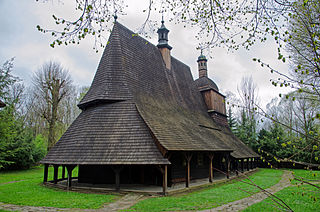
The wooden churches of southern Lesser Poland of the UNESCO inscription are located in Binarowa, Blizne, Dębno, Haczów, Lipnica Murowana, and Sękowa. There are in fact many others of the region which fit the description: "The wooden churches of southern Little Poland represent outstanding examples of the different aspects of medieval church-building traditions in Roman Catholic culture. Built using the horizontal log technique, common in eastern and northern Europe since the Middle Ages..."

The Carmelite Church of St. Theresa is a late-Renaissance church in the city of Przemyśl, in the Subcarpathian Voivodship in southern Poland.

Ulucz is a village in the administrative district of Gmina Dydnia, within Brzozów County, Subcarpathian Voivodeship, in south-eastern Poland. The village has a population of 150. It lies approximately 9 kilometres (6 mi) east of Dydnia, 20 km (12 mi) east of Brzozów, and 44 km (27 mi) south-east of the regional capital Rzeszów.

Komańcza is a village in the Sanok County, in the Subcarpathian Voivodeship (province) of south-eastern Poland. It is situated in the Bukowsko Upland mountains, located near the towns of Medzilaborce and Palota.

The Gate Church of the Trinity is a historic church of the ancient cave monastery of Kyiv Pechersk Lavra in Kyiv, the capital of Ukraine. Originally being built as a Kievan Rus' style church, the Gate Church of the Trinity is now decorated in the Ukrainian Baroque style, having been reconstructed many times through its history.

The Dominican church and monastery in Lviv, Ukraine is located in the city's Old Town, east of the market square. It was originally built as the Roman Catholic church of Corpus Christi, and today serves as the Greek Catholic church of the Holy Eucharist.

The Church of the Transfiguration in Lviv, Ukraine is located in the city's Old Town, just north of the market square.

Młyny is a village in the administrative district of Gmina Radymno, within Jarosław County, Subcarpathian Voivodeship, in south-eastern Poland, close to the border with Ukraine. It lies approximately 19 kilometres (12 mi) east of Radymno, 29 km (18 mi) east of Jarosław, and 77 km (48 mi) east of the regional capital Rzeszów.

Carpathian Wooden Churches is the name of a UNESCO World Heritage Site that consists of nine wooden religious buildings constructed between the 16th and 18th centuries in eight different locations in Slovakia. They include two Roman Catholic, three Protestant and three Greek Catholic churches plus one belfry in Hronsek. In addition to these churches there are about 50 more wooden churches in the territory of present-day Slovakia mainly in the northern and eastern part of the Prešov Region.

The Wooden Tserkvas of the Carpathian Region in Poland and Ukraine are a group of wooden Orthodox churches located in Poland and Ukraine which were inscribed in 2013 on the UNESCO World Heritage List which explains:
built of horizontal wooden logs between the 16th and 19th centuries by communities of Orthodox and Greek Catholic faiths. The tserkvas bear testimony to a distinct building tradition rooted in Orthodox ecclesiastic design interwoven with elements of local tradition, and symbolic references to their communities’ cosmogony. — World Heritage Centre

Saints Philip's and Jacob's Church in Sękowa - a Gothic, wooden church located in the village of Sękowa from the fifteenth-century, which together with different churches is designated as part of the UNESCO Wooden Churches of Southern Lesser Poland. Due to its history and unique architecture the church is frequently called the Pearl of the Beskid Niski.

St. Michael Archangel's Church in Dębno is a Roman Catholic Gothic-wooden church located in the Polish village of Dębno from the fifteenth-century. Together with different churches, it is designated as part of the UNESCO Wooden Churches of Southern Lesser Poland.
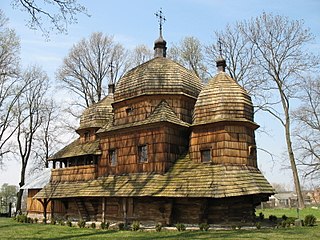
Mother of God Church in Chotyniec - a Gothic, wooden church located in the village of Chotyniec from the seventeenth-century, which together with different tserkvas is designated as part of the UNESCO Wooden tserkvas of the Carpathian region in Poland and Ukraine.
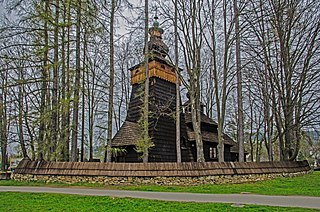
St. James Church is a Gothic, wooden church located in the village of Powroźnik, southern Poland. It dates from the seventeenth or eighteenth-century. Together with different tserkvas it is designated as part of the UNESCO World Heritage Site "Wooden tserkvas of the Carpathian region in Poland and Ukraine".
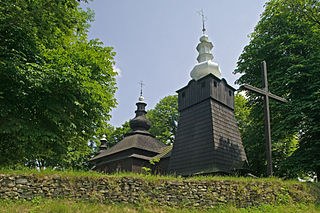
St. Michael Archangel's Church in Brunary is a Gothic, wooden church located in the village of Brunary from the eighteenth-century, which together with different tserkvas is designated as part of the UNESCO Wooden tserkvas of the Carpathian region in Poland and Ukraine.

St. Michael Archangel's Church in Smolnik - a Gothic, wooden church located in the village of Smolnik from the eighteenth-century, which together with different tserkvas is designated as part of the UNESCO Wooden tserkvas of the Carpathian region in Poland and Ukraine.

St. Michael Archangel's Church in Turzańsk ( - a Gothic, wooden church located in the village of Turzańsk from the nineteenth-century, which together with different tserkvas is designated as part of the UNESCO Wooden tserkvas of the Carpathian region in Poland and Ukraine.

St. Paraskevi Church in Kwiatoń - a Gothic, wooden church located in the village of Kwiatoń from the nineteenth-century, which together with different tserkvas is designated as part of the UNESCO Wooden tserkvas of the Carpathian region in Poland and Ukraine.
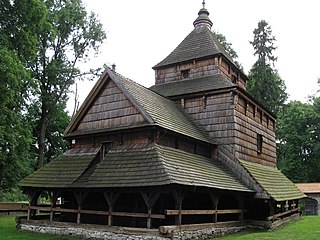
St. Paraskevi Church in Radruż - a Gothic, wooden church located in the village of Radruż from the sixteenth-century, which together with different tserkvas is designated as part of the UNESCO Wooden tserkvas of the Carpathian region in Poland and Ukraine.




















